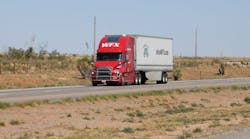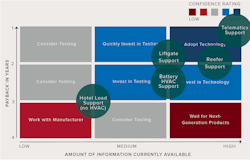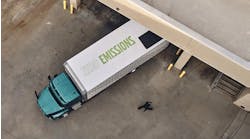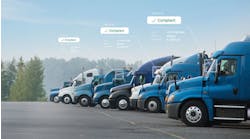Solar panels for tractors and trailers – really? It’s the first question Michael Roeth, executive director for the North American Council for Freight Efficiency (NACFE), had and has been asked regarding the installation of solar panels on heavy trucks.
But what Roeth, the rest of the study team at NACFE, and their research partner Rocky Mountain Institute found is that solar panels do have a good place in trucking.
NACFE just issued its latest Confidence Report on Solar for Trucks and Trailers, which aims to explain solar applications for tractors and trailers, describe considerations to take into account when evaluating whether to invest in solar panels, and create awareness about the major trends driving and influencing the field of solar technologies as applied to commercial vehicles.
The report found that the main use of solar on tractors is to supplement battery HVAC systems and hotel loads without adding additional batteries to the truck. NACFE found that the biggest benefit of solar panels came from extending battery life and avoiding emergency roadside assistance for dead batteries.
“That’s a big cost and something fleets may not follow that closely,” Roeth said. “That cost to replace batteries and the cost of having to go out and jump start the truck are the bigger of the cost savings we see when dealing with solar.”
According to the report, solar panels can extend the runtime of battery HVAC systems, not only to help the HVAC system make it through the night without draining the truck’s batteries, but also to reduce the load on the alternator the next morning, resulting in fuel savings. Solar panels can augment the energy coming from the truck batteries and maintain the batteries at a higher state of charge extending the battery life and increasing driver comfort by allowing hotel loads to operate for longer periods of time, Roeth pointed out.
In addition, Roeth pointed out the four main conclusions of the report:
- Solar technology has progressed to where this is a real solution that fleets are utilizing and making work on their tractors and trailers. The costs and benefits mean that solar has a payback for them and makes sense to them, he said.
- Although solar panels take in a lot of energy, fuel savings are generally quite small, Roeth explained. Fuel savings depends on certain factors, for instance, what city a fleet operates in, and how often and intense that solar energy is.
- Solar panel installations need to be sized appropriately for their intended application. There are a lot of options with these solar packs, and they typically come in standard sizes. “It’s really important to understand what problem you’re trying to solve,” Roeth explained. “Is it the battery HVAC time for the drivers? Is it making sure the starter batteries have juice in them so you don’t have a dead truck?”
- Manufacturers are continually improving their products and performance is improving all the time, Roeth explained. “We looked at what they’re saying versus what we’re seeing in the real world and we think it’s close,” he said. “But as they continue to improve their product, I would see the costs continue to come down and the panels continue to improve in the future.”
Solar panels might also help with the industry’s widespread challenge of attracting, recruiting and retaining drivers.
“We found some comments from drivers and a fleet manager really helpful in all of this,” Roeth noted. “What we heard from the drivers and what we believe is that this is an opportunity to retain and attract drivers with respect to what they expect in the hotel loads and what they expect in the HVAC system.”
For instance, two of the seven tractors in NACFE’s 2017 Run on Less demonstration already had solar panels on the tractor and an additional vehicle had solar panels on its dedicated trailer. Henry Albert of Albert Trucking had his truck outfitted with the panels during the event last fall.
“Sitting here at the dock, in the hot sun, having solar power to keep my batteries charged and have the air conditioning inside the cab works out very nice since the addition of the [solar] system to my truck,” Albert said.
And when it comes to trailers, solar applications include support for liftgates, telematics, and refrigeration units.
“If a trailer has small electrical loads like a telematics system, then a small solar panel that ensures that the system will have virtually 100% availability for trailer location and other related data makes a great deal of sense,” Roeth pointed out.
NACFE’s study team developed a payback calculator analysis tool to help fleets estimate the total savings and payback time of a tractor-mounted solar system, using their own data or best estimates. In addition, the team developed a confidence matrix to inform fleets of the study team’s confidence in the technology versus the payback a fleet should expect to receive from the technology.
“We see solar as a linkage to electric trucks and more electrification of the trucks,” Roeth concluded. “At the end of the day we don’t know, but we think that will help attract the next set of drivers, the next set of technicians, the next set of fleet managers who are very dedicated to sustainability and greening the trucking industry.”





